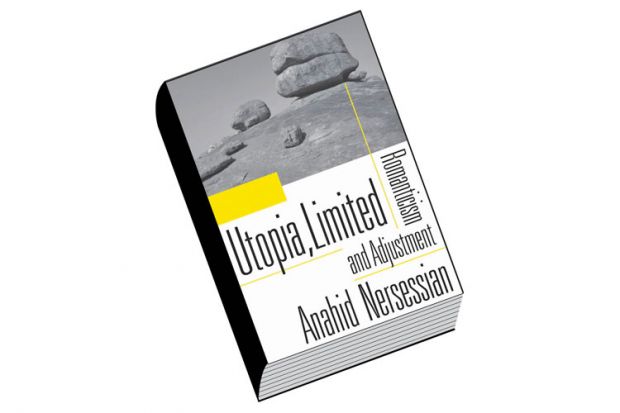The pendulum of the politics of value in art has for some time now swung to the Left. Where the Marxist criticism of bygone decades undermined the claims to value of “high” art by exposing its ideologically suspect bases, the current trend in ethical criticism and its most recent progeny, affect studies, has been to recover for literature a critical role in promoting social and political responsibility. Countering what has become the ultra-aestheticism of the far Right, this trend is driven by a renewed and welcome recognition of literature’s ability to address the ethical potential of feeling, an ethics no less powerful because it insists on, and incorporates, the fragility of its ground.
Anahid Nersessian’s book is among the latest contributions to this trend. From a specific set of Romantic-era texts, she elicits an idea of Utopia, alternative to the fantasy worlds of inexhaustible plenitude or other kinds of limitlessness more usually associated with the term. Attending to form as the enabling bound of aspiration and the condition of art, Romanticism offers, she argues, a version of utopian thought whose operatives are limitation, restraint and privation; it is “utopian” because it posits a “minimally harmful relation” between human beings and their world. This Romantic Utopia is not escapist, but rather “a world where the extraordinary is newly calibrated to the ordinary in such a way that everyday life crackles with that ‘certain charge’ while remaining recognizably pedestrian”. The paraphrase instantly (if not deliberately) recalls Percy Bysshe Shelley’s original: “Poetry lifts the veil from the hidden beauty of the world, and makes familiar objects be as if they were not familiar.”
Utopia, Limited belongs to a tradition of Marxist utopian thought associated with Ernst Bloch’s distinction between “abstract” and “concrete” Utopia; the first, an impossible model of societal perfection sealed off from historical process, the second, a real possibility, imagined as the outcome of human will propelling us towards social change. Like Bloch’s, Nersessian’s concern is with art as an expression of the possibility of reconciling social reality with human ideals. Her other intellectual springboard is Northrop Frye’s nascent work on Romanticism and Utopia in his abandoned “Third Book” notebooks, 1964-72. From Frye she takes the idea of “low adjustment utopia”, and she borrows, too, his notebook shorthand, “Rcsm”, as her gimmicky signifier for “the down-tuning of an aspirational form to its not-quite-barest minimum”.
Nersessian’s project, to counter the consumerist fantasy of limitless consumption with the Utopia of a sustainable ecology, is skilfully executed. Her argument’s backbone is in her virtuoso analyses of form. Unravelling the rhetorical strategies at work in a range of Romantic texts, she is both original and genuinely insightful. Another pleasure is her flair for the unexpected lead-in: from an essay on child molestation, for instance, to Immanuel Kant’s view of Enlightenment, and from Alan Hollinghurst to William Hazlitt.
This is a book that manages to be moral, informative and entertaining all at once. My niggle is that for all the dexterity of Nersessian’s formal and theoretical analyses, the content of her paradigmatic texts, Shelley’s The Revolt of Islam and Hazlitt’s Liber Amoris, remains stubbornly intransigent. Other readers, like me, may struggle to experience the not-quite-drama of a failed revolution, or the story of a destructive sexual obsession, as inspirational models for “the hard work of living limitedly” or “a roadmap for our own restricted present”.
Nonetheless, against an enduring ideological critique, of which Romanticism has been the particular target, Nersessian’s view of a humane and socially engaged body of literature works as a powerful corrective.
Uttara Natarajan is reader in English, Goldsmiths, University of London.
Utopia, Limited: Romanticism and Adjustment
By Anahid Nersessian
Harvard University Press, 280pp, £29.95
ISBN 9780674434578
Published 26 March 2015
